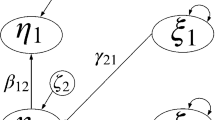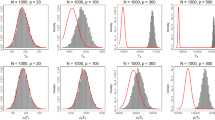Abstract
In an addendum to his seminal 1969 article Jöreskog stated two sets of conditions for rotational identification of the oblique factor solution under utilization of fixed zero elements in the factor loadings matrix (Jöreskog in Advances in factor analysis and structural equation models, pp. 40–43, 1979). These condition sets, formulated under factor correlation and factor covariance metrics, respectively, were claimed to be equivalent and to lead to global rotational uniqueness of the factor solution. It is shown here that the conditions for the oblique factor correlation structure need to be amended for global rotational uniqueness, and, hence, that the condition sets are not equivalent in terms of unicity of the solution.
Similar content being viewed by others
References
Anderson, T.W. (1984). An introduction to multivariate statistical analysis. New York: Wiley.
Asparouhov, T., & Muthén, B. (2009). Exploratory structural equation modeling. Structural Equation Modeling, 16, 397–438.
Bekker, P.A., Merckens, A., & Wansbeek, T.J. (1994). Identification, equivalent models, and computer algebra. Boston: Academic Press.
Bollen, K.A., & Jöreskog, K.G. (1985). Uniqueness does not imply identification: A note on confirmatory factor analysis. Sociological Methods and Research, 14, 155–163.
Dolan, C.V., & Molenaar, P.C.M. (1991). A comparison of four methods of calculating standard errors of maximum-likelihood estimates in the analysis of covariance structure. British Journal of Mathematical and Statistical Psychology, 44, 359–368.
Dunn, J.E. (1973). A note on a sufficiency condition for uniqueness of a restricted factor matrix. Psychometrika, 38, 141–143.
Geweke, J.F., & Zhou, G. (1996). Measuring the pricing error of the arbitrage pricing theory. Review of Financial Studies, 9, 557–587.
Howe, W.G. (1955). Some contributions to factor analysis (Tech. Rep. No. ORNL-1919). Oak Ridge, Tennessee: Oak Ridge National Laboratory.
Hoyle, R.H., & Duvall, J.L. (2004). Determining the number of factors in exploratory and confirmatory factor analysis. In D. Kaplan (Ed.), The SAGE handbook of quantitative methodology for the social sciences (pp. 301–315). Thousand Oaks: SAGE.
Jennrich, R.I. (1978). Rotational equivalence of factor loading matrices with specified values. Psychometrika, 43, 421–426.
Jöreskog, K.G. (1969). A general approach to confirmatory maximum likelihood factor analysis. Psychometrika, 34, 183–202.
Jöreskog, K.G. (1979). Author’s addendum. In J. Magidson (Ed.), Advances in factor analysis and structural equation models (pp. 40–43). Cambridge: Abt Books.
Mulaik, S.A. (2010). Foundations of factor analysis (2nd ed.). Boca Raton: Chapman and Hall/CRC.
Acknowledgements
This research was supported by grant NWO-VICI-453-05-002 of the Netherlands Organization for Scientific Research (NWO). The author would like to thank the Editor, Associate Editor, and two anonymous reviewers for constructive comments.
Author information
Authors and Affiliations
Corresponding author
Additional information
Written while a Ph.D. candidate at the Department of Methodology and Statistics, Utrecht University, Utrecht, the Netherlands. Starting February 1, the author will be at the Department of Epidemiology & Biostatistics, VU University medical center, Amsterdam, the Netherlands.
Rights and permissions
About this article
Cite this article
Peeters, C.F.W. Rotational Uniqueness Conditions Under Oblique Factor Correlation Metric. Psychometrika 77, 288–292 (2012). https://doi.org/10.1007/s11336-012-9259-3
Received:
Revised:
Published:
Issue Date:
DOI: https://doi.org/10.1007/s11336-012-9259-3




